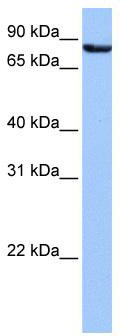UBQLN3 Rabbit Polyclonal Antibody
Frequently bought together (2)
beta Actin Mouse Monoclonal Antibody, Clone OTI1, Loading Control
USD 200.00
Other products for "UBQLN3"
Specifications
| Product Data | |
| Applications | WB |
| Recommended Dilution | WB |
| Reactivities | Human |
| Host | Rabbit |
| Isotype | IgG |
| Clonality | Polyclonal |
| Immunogen | The immunogen for Anti-UBQLN3 Antibody: synthetic peptide directed towards the N terminal of human UBQLN3. Synthetic peptide located within the following region: LMRQHVSVPEFVTQLIDDPFIPGLLSNTGLVRQLVLDNPHMQQLIQHNPE |
| Formulation | Liquid. Purified antibody supplied in 1x PBS buffer with 0.09% (w/v) sodium azide and 2% sucrose. Note that this product is shipped as lyophilized powder to China customers. |
| Purification | Affinity Purified |
| Conjugation | Unconjugated |
| Storage | Store at -20°C as received. |
| Stability | Stable for 12 months from date of receipt. |
| Predicted Protein Size | 72 kDa |
| Gene Name | ubiquilin 3 |
| Database Link | |
| Background | UBQLN3 is an ubiquitin-like protein (ubiquilin) that shares high degree of similarity with related products in yeast, rat and frog. Ubiquilins contain a N-terminal ubiquitin-like domain and a C-terminal ubiquitin-associated domain. They physically associate with both proteasomes and ubiquitin ligases, and thus thought to functionally link the ubiquitination machinery to the proteasome to affect in vivo protein degradation. UBQLN3 is specifically expressed in the testis, and proposed to regulate cell-cycle progression during spermatogenesis. This gene encodes an ubiquitin-like protein (ubiquilin) that shares high degree of similarity with related products in yeast, rat and frog. Ubiquilins contain a N-terminal ubiquitin-like domain and a C-terminal ubiquitin-associated domain. They physically associate with both proteasomes and ubiquitin ligases, and thus thought to functionally link the ubiquitination machinery to the proteasome to affect in vivo protein degradation. This gene is specifically expressed in the testis, and proposed to regulate cell-cycle progression during spermatogenesis. |
| Synonyms | TUP-1 |
| Note | Immunogen Sequence Homology: Horse: 100%; Human: 100%; Mouse: 100%; Bovine: 100%; Rabbit: 100%; Dog: 93%; Rat: 93%; Pig: 86% |
| Reference Data | |
| Protein Families | Druggable Genome |
Documents
| Product Manuals |
| FAQs |
| SDS |
{0} Product Review(s)
0 Product Review(s)
Submit review
Be the first one to submit a review
Product Citations
*Delivery time may vary from web posted schedule. Occasional delays may occur due to unforeseen
complexities in the preparation of your product. International customers may expect an additional 1-2 weeks
in shipping.






























































































































































































































































 Germany
Germany
 Japan
Japan
 United Kingdom
United Kingdom
 China
China



